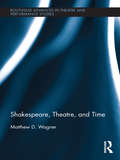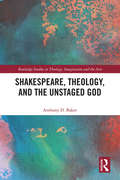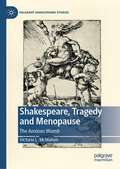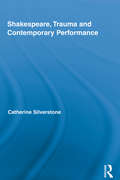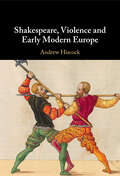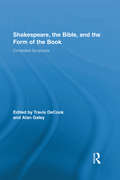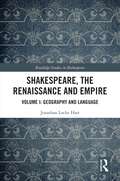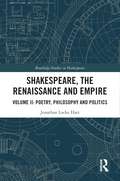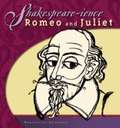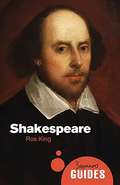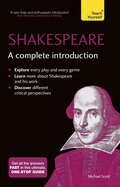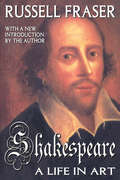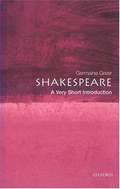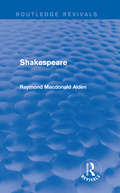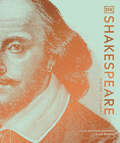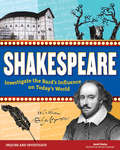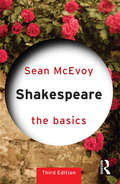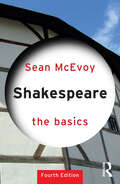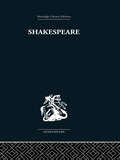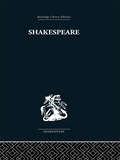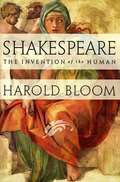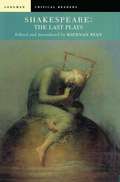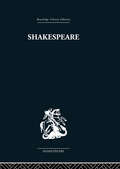- Table View
- List View
Shakespeare, Theatre, and Time (Routledge Advances in Theatre & Performance Studies #20)
by Matthew WagnerThat Shakespeare thematized time thoroughly, almost obsessively, in his plays is well established: time is, among other things, a 'devourer' (Love's Labour's Lost), one who can untie knots (Twelfth Night), or, perhaps most famously, simply ‘out of joint’ (Hamlet). Yet most critical commentary on time and Shakespeare tends to incorporate little focus on time as an essential - if elusive - element of stage praxis. This book aims to fill that gap; Wagner's focus is specifically performative, asking after time as a stage phenomenon rather than a literary theme or poetic metaphor. His primary approach is phenomenological, as the book aims to describe how time operates on Shakespearean stages. Through philosophical, historiographical, dramaturgical, and performative perspectives, Wagner examines the ways in which theatrical activity generates a manifest presence of time, and he demonstrates Shakespeare’s acute awareness and manipulation of this phenomenon. Underpinning these investigations is the argument that theatrical time, and especially Shakespearean time, is rooted in temporal conflict and ‘thickness’ (the heightened sense of the present moment bearing the weight of both the past and the future). Throughout the book, Wagner traces the ways in which time transcends thematic and metaphorical functions, and forms an essential part of Shakespearean stage praxis.
Shakespeare, Theology, and the Unstaged God (Routledge Studies in Theology, Imagination and the Arts)
by Anthony D. BakerWhile many scholars in Shakespeare and Religious Studies assume a secularist viewpoint in their interpretation of Shakespeare’s works, there are others that allow for a theologically coherent reading. Located within the turn to religion in Shakespeare studies, this book goes beyond the claim that Shakespeare simply made artistic use of religious material in his drama. It argues that his plays inhabit a complex and rich theological atmosphere, individually, by genre and as a body of work. The book begins by acknowledging that a plot-controlling God figure, or even a consistent theological dogma, is largely absent in the plays of Shakespeare. However, it argues that this absence is not necessarily a sign of secularization, but functions in a theologically generative manner. It goes on to suggest that the plays reveal a consistent, if variant, attention to the theological possibility of a divine "presence" mediated through human wit, both in gracious and malicious forms. Without any prejudice for divine intervention, the plots actually gesture on many turns toward a hidden supernatural "actor", or God. Making bold claims about the artistic and theological of Shakespeare’s work, this book will be of interest to scholars of Theology and the Arts, Shakespeare and Literature more generally.
Shakespeare, Tragedy and Menopause: The Anxious Womb (Palgrave Shakespeare Studies)
by Victoria L. McMahonShakespeare was not only aware of the socio-cultural fears and anxieties generated by the older woman’s body but with the characterization of his tragic ageing females, Shakespeare becomes the first literary giant to explore the physiological and psychosocial condition that we have come to know as ‘menopause’. Although ‘menopause’ was not defined as a medical, physiological or sociocultural event for the early moderns, this book argues that such a medical and cultural transition can, in fact, be identified by sub-textual clues distinguished by various embodied anxieties. It explores several ageing women of the Shakespearean tragedies as they transition through this liminal menopausal period. Theoretically underscored by humoral theory, the analysis is metonymically centered upon the womb as the seat of menopausal anxiety. These menopausal undercurrents, not only permeate the dramatic action of each play, but also emanate outward to reflect the medical, physiological, cultural, social, and religious concerns generated by the ageing woman of the early modern period at large.
Shakespeare, Trauma and Contemporary Performance (Routledge Studies in Shakespeare)
by Catherine SilverstoneShakespeare, Trauma and Contemporary Performance examines how contemporary performances of Shakespeare’s texts on stage and screen engage with violent events and histories. The book attempts to account for – but not to rationalize – the ongoing and pernicious effects of various forms of violence as they have emerged in selected contemporary performances of Shakespeare’s texts, especially as that violence relates to apartheid, colonization, racism, homophobia and war. Through a series of wide-ranging case studies, which are informed by debates in Shakespeare, trauma and performance studies and developed from extensive archival research, the book examines how performances and their documentary traces work variously to memorialize, remember and witness violent events and histories. In the process, Silverstone considers the ethical and political implications of attempts to represent trauma in performance, especially in relation to performing, spectatorship and community formation. Ranging from the mainstream to the fringe, key performances discussed include Gregory Doran’s Titus Andronicus (1995) for Johannesburg’s Market Theatre; Don C. Selwyn’s New Zealand-made film, The Maori Merchant of Venice (2001); Philip Osment’s appropriation of The Tempest in This Island’s Mine for London’s Gay Sweatshop (1988); and Nicholas Hytner’s Henry V (2003) for the National Theatre in London.
Shakespeare, Violence and Early Modern Europe
by Andrew HiscockShakespeare, Violence and Early Modern Europe broadens our understanding of the final years of the last Tudor monarch, revealing the truly international context in which they must be understood. Uncovering the extent to which Shakespeare's dramatic art intersected with European politics, Andrew Hiscock brings together close readings of the history plays, compelling insights into late Elizabethan political culture and renewed attention to neglected continental accounts of Elizabeth I. With fresh perspective, the book charts the profound influence that Shakespeare and ambitious courtiers had upon succeeding generations of European writers, dramatists and audiences following the turn of the sixteenth century. Informed by early modern and contemporary cultural debate, this book demonstrates how the study of early modern violence can illuminate ongoing crises of interpretation concerning brutality, victimization and complicity today.
Shakespeare, the Bible, and the Form of the Book: Contested Scriptures (Routledge Studies in Shakespeare)
by Alan Galey Travis DeCookWhy do Shakespeare and the English Bible seem to have an inherent relationship with each other? How have these two monumental traditions in the history of the book functioned as mutually reinforcing sources of cultural authority? How do material books and related reading practices serve as specific sites of intersection between these two textual traditions? This collection makes a significant intervention in our understanding of Shakespeare, the Bible, and the role of textual materiality in the construction of cultural authority. Departing from conventional source study, it questions the often naturalized links between the Shakespearean and biblical corpora, examining instead the historically contingent ways these links have been forged. The volume brings together leading scholars in Shakespeare, book history, and the Bible as literature, whose essays converge on the question of Scripture as source versus Scripture as process—whether that scripture is biblical or Shakespearean—and in turn explore themes such as cultural authority, pedagogy, secularism, textual scholarship, and the materiality of texts. Covering an historical span from Shakespeare’s post-Reformation era to present-day Northern Ireland, the volume uncovers how Shakespeare and the Bible’s intertwined histories illuminate the enduring tensions between materiality and transcendence in the history of the book.
Shakespeare, the Queen'S Men, and the Elizabethan Performance of History
by Brian WalshThe Elizabethan history play was one of the most prevalent dramatic genres of the 1590s, and so was a major contribution to Elizabethan historical culture. The genre has been well served by critical studies that emphasize politics and ideology; however, there has been less interest in the way history is interrogated as an idea in these plays. Drawing in period-sensitive ways on the field of contemporary performance theory, Walsh looks at the Shakespearean history play from a fresh angle, by first analyzing the foundational work of the Queen's Men, the playing company that invented the popular history play. Through innovative readings of their plays including The Famous Victories of Henry V before moving on to Shakespeare's 1 Henry VI, Richard III, and Henry V, this book investigates how the Queen's Men's self-consciousness about performance helped to shape Shakespeare's dramatic and historical imagination.
Shakespeare, the Renaissance and Empire: Volume I: Geography and Language (Routledge Studies in Shakespeare #1)
by Jonathan Locke HartShakespeare, the Renaissance and Empire presents Shakespeare as both a local and global writer, investigating Shakespeare’s trans-cultural writing through the interrelations and interactions of binaries including theory and practice, past and present, aesthetics and ethics, freedom and tyranny, republic and empire, empires and colonies, poetry and history, rhetoric and poetics, England and America, and England and Asia. The book breaks away from traditional western-centric analysis to present a universal Shakespeare, exposing readers to the relevance and significance of Shakespeare within their local contexts and cultures. This text aims to present a global Shakespeare, utilizing a dual perspective or dialectical presentation, mainly centred on questions of (1) how Shakespeare can be viewed as both an English writer and a world writer; (2) how language operates across genres and kinds of discourse; and (3) how Shakespeare helps to articulate a poetics of both texts (literature) and contexts (cultures). The book’s originality lies in its articulation of the importance and value of Shakespeare in the emerging landscape of global culture.
Shakespeare, the Renaissance and Empire: Volume II: Poetry, Philosophy and Politics (Routledge Studies in Shakespeare #2)
by Jonathan Locke HartShakespeare, the Renaissance and Empire: Poetry, Philosophy and Politics is the second volume of this study and builds on the first, which concentrated on related matters, including geography and language. In both volumes, a key focus is close analysis of the text and an attention to Shakespeare’s use of signs, verbal and visual, to represent the world in poetry and prose, in dramatic and non-dramatic work as well as some of the contexts before, during and after the Renaissance. Shakespeare’s representation of character and action in poetry and theatre, his interpretation and subsequent interpretations of him are central to the book as seen through these topics: German Shakespeare, a life and no life, aesthetics and ethics, liberty and tyranny, philosophy and poetry, theory and practice, image and text. The book also explores the typology of then and now, local and global.
Shakespeare-ience: Romeo and Juliet
by Robert D. StricklandNo matter how you teach Shakespeare, you can re-energize your curriculum with this all-new, unabridged version of Romeo and Juliet. Based in scholarship and incorporating the best teaching practices, Shakespeare-ience will help your students master the Bard's language and deepen their understanding of the characters and events in the play. For a LITERARY STUDY of the play Easy-to-follow side glosses make text accessible. Fascinating background notes throughout keep students interested. Page-by-page plot summaries aid comprehension. Play questions focus on critical analysis. For a PERFORMANCE-BASED STUDY of the play Speaking, listening, writing, and reading activities provide a balanced literacy experience. Personas created by each student keep everyone in the class involved throughout the play. Pre-scene improvisations help connect the students' world and the world of the play. Abundant pre- and during-play suggestions help with character motivation.
Shakespeare: A Beginner's Guide (Beginner's Guides)
by Ros KingWhether the fault of tedious teachers or hammy actors, Shakespeare is often seen as dry and impenetrable. In this fast-paced introduction, Ros King sets out to remind us of the sheer beauty and sophistication that can make Shakespeare's works a joy for any audience. Exploring his invention, wit, along with his uncanny characterisation, King argues archaic language should be no barrier to the modern reader. With summaries of The Bard's life and background, explanations of the plays' origins and instructions on how to read his poetry, Shakespeare: A Beginner's Guide provides all the tools the general reader needs to embrace the greatest writer in the English language.
Shakespeare: A Complete Introduction
by Michael ScottWritten by an academic and literary scholar with decades of experience in teaching Shakespeare to students at all levels, Shakespeare: A Complete Introduction is designed to give you everything you need to succeed, all in one place. It covers the key themes and critical concepts that students are expected to be confident in, outlining the ideas in clear jargon-free English, and then providing added-value features like key quotes, chapter recap sections, and even lists of questions you might be asked in your seminar or exam.The book organizes Shakespeare's work by genre and theme, in order to look closely at the individual plays. It opens with contextualizing information about the original texts, language usage, and how the plays were performed. The book is then grouped into the genres of early and romantic Comedies, Tragedies, Problem Plays, and the Histories. Each chapter will focus on one or two key plays, and foreground the themes and preoccupations that surround critical work on those plays. Throughout the book there will be an emphasis on the historical vs the contemporary approach, and the distinctions between literary and theatrical competencies.
Shakespeare: A Complete Introduction
by Michael ScottYour complete introduction to ShakespeareWilliam Shakespeare has been hailed as one of the greatest thinkers of all time, one of the world's finest artists, poets and dramatists. Shakespeare: A Complete Introduction introduces and explains the plays by looking at how they work, taking you on a journey through the genres of comedy, history and tragedy. The best known and most popular plays are discussed in detail and even plays in which Shakespeare may have had only the briefest creative and collaborative interest as a writer, get at least a mention. With material on his poetry and discussions on aspects of his life too, this truly is a complete introduction to Shakespeare.'A very lively and enthusiastic introduction to the full range of Shakespeare's plays' John Drakakis, Professor of English, University of Stirling'A masterpiece of the genre, written as it is with passion, without condescension, without jargon, thoughtful and open to changing critical theories, but always returning to the plays themselves, plays that fully reveal themselves most in performance.' Martin Wine, Professor Emeritus of English at the University of Illinois at Chicago (UIC)
Shakespeare: A Life in Art
by Russell FraserShakespeare: A Life in Art brings together in a single volume Fraser's previously published two-volume biography (Young Shakespeare, 1988, and Shakespeare: The Later Years, 1992). This volume includes a new introduction, which looks back on the author's lifelong commitment to Shakespeare's work and seeks to find the pattern in his carpet.Fraser's approach places Shakespeare's work first but shows how the life and art interpenetrate, like the yolk and white of one shell. What Shakespeare was doing in Stratford and London underlies what he was writing, or more exactly, the two flow together. Most of the book is devoted to Shakespeare the man and artist, but it simultaneously throws light on his literary and personal relations with contemporaries such as Jonson, Marlowe, and others known as the University Wits. His experience as an actor and man of theater is absorbingly recounted here, as well as his relations to well-born patrons like the Earl of Southampton and Henry Carey, Lord Hunsdon (England's Lord Chamberlain). In 1603 when James I ascended the throne, the Chamberlain's Men became the King's Men, passing under the sovereign's protection. How Shakespeare responded to his ambiguous role--he was both servant to the great and their remorseless critic--is another of Fraser's subjects. In short, Fraser's principal purpose is to advance our understanding of Shakespeare, at the same time throwing light on the work of the man who of all modern, and perhaps ancient poets had the largest and most comprehensive soul. John Dryden, Shakespeare's first great critic, said that, and Fraser tries to estimate what he meant.
Shakespeare: A Very Short Introduction
by Germaine GreerA clear introduction to Shakespeare's plays, this volume examines them in detail and shows how Shakespeare dramatized moral and intellectual issues in such a way that his audience became dazzlingly aware of an imaginative dimension to daily life. Germaine Greer argues that as long as Shakespeare's work remains central to English cultural life, it will retain the values which make it unique in the world.
Shakespeare: From The Quarto Of 1609, With Variorum Readings And Commentary (Routledge Revivals)
by Raymond Macdonald AldenThis fascinating title, first published in 1922, presents a detailed overview of the life and works of Shakespeare. Alden first considers Shakespeare’s Elizabethan context, alongside exploring the Classical and Italian foundations, political theories, concepts and theatrical trends that influenced his works. Next, a comprehensive biography provides insight into Shakespeare’s probable education, relationships and contemporaries. The final sections are devoted to the genres into which Shakespeare’s works have been categorised, with full analyses of and backgrounds to the poems, histories, comedies and tragedies. An important study, this title will be of particular value to students in need of a comprehensive overview of Shakespeare’s life and works, as well as the more general inquisitive reader.
Shakespeare: His Life and Works (DK Ultimate Guides)
by Leslie Dunton-Downer Alan RidingA comprehensive collection of the life and works of a literary great — William Shakespeare!The beautifully illustrated guide unravels the life and works of Shakespeare and his plays, from language, history, and themes to plays, poems, and sonnets. Explore the art of this famous playwright and his enduring legacy through the stunning gift format.Celebrate one of the theaters most influential contributors through his legendary works of comedy, tragedy, romance, and poetry. Inside this playbook, you&’ll find: • A clear and accessible format. • Plot summaries of all 39 plays with lists of characters. • Guidance on how to read and interpret his great sonnets and narrative poems. • Plays ordered by time and genre, helping readers trace the development of Shakespeare&’s topics, themes, and artistry. • Sidebars that clarify the mythological, geographical and historical context of each play and decode its language, dramatic action, and themes. • Illuminated guidance on how to approach reading the play and seeing it perform.Shakespeare fans will revel in the marvelous depiction of the Stratford-upon-Avon born Bard himself! His drama book allows you to dive into famous works like Hamlet, Romeo and Juliet, and A Midsummer Night&’s Dream, and explore Shakespeare&’s sources and inspirations for each! Themes, plots, characters, and language are brought to life with act-by-act plot summaries, resumes of main characters, and in-depth analysis of Shakespeare&’s use of the English language. Shakespeare: His Life and Works is a wonderful exploration of plays, poems, and sonnets in the context of his life and the Elizabethan and Jacobean theatre, further enriching your on the page (or stage, or screen!) experience.
Shakespeare: Investigate the Bard's Influence on Today's World
by Samuel Carbaugh Andi Diehn"Romeo, Romeo, wherefore art thou Romeo?" Teenagers have been sighing an approximation of these words for centuries, ever since William Shakespeare had Juliet utter them from her balcony in one of the most popular plays of all time, Romeo and Juliet. Tales of love, loss, rebellion, rivalry-before there was Twilight, Warm Bodies, and The Lion King, there was Shakespeare. The characters, language, imagery, and plot elements of many books and movies that appear on bookshelves and in cinemas today are directly influenced by the plays of the Bard.In Shakespeare: Investigate the Bard's Influence on Today's World, readers discover links between the books, movies, and music they listen to today and the words that were written and acted out more than 400 years ago. Readers deconstruct Shakespearean themes, imagery, language, and meaning by finding familiar ground on which to gain literary insight. Through hands-on projects such as coding a video game based on one of Shakespeare's plays to rewriting a scene in the text language of emoji, readers find compelling avenues into the dramatic, sometimes intimidating language, leaving them well-equipped to tackle any major text in the academic years to come.
Shakespeare: The Basics (The Basics)
by Sean McEvoyNow in its third edition Shakespeare: The Basics is an insightful and informative introduction to the work of William Shakespeare. Exploring all aspects of Shakespeare’s plays including the language, cultural contexts, and modern interpretations, this text looks at how a range of plays from across the genres have been understood. Updates in this edition include: Ecocritical, queer, presentist and gendered discussions of Shakespeare’s work Studies of new performances including Tennant and Tate’s Much Ado About Nothing Critical discussions of race and politics in Othello and King Lear Case studies of modern film versions of Shakespeare’s works A chronology of Shakespeare’s work and contemporary events With fully updated further reading throughout and a wide range of case studies and examples, this text is essential reading for all those studying Shakespeare’s work.
Shakespeare: The Basics (The Basics)
by Sean McEvoyShakespeare: The Basics is a lively and accessible introduction to reading and studying Shakespeare. Exploring all aspects of Shakespeare’s plays, Sean McEvoy considers the language, cultural contexts and modern interpretations.This essential guide to a range of contemporary Shakespearean criticism explores and unpacks the different dramatic genres in which he wrote – comedy, history, tragedy and romance. It also provides a wealth of relevant and concise information on the historical, social and political contexts in which the plays were produced and have been understood. Extensively updated throughout, the fourth edition provides: A comprehensive account of Shakespearean tragedy for students An introduction to ecocritical, ethical and queer readings of the plays Analysis of notable recent Shakespeare films and productions Enhanced contextual material on race and empire, gender roles and the theatre in politics With fully updated further reading throughout and a wide range of case studies and examples, Shakespeare: The Basics is an indispensable introduction for college and university students of literature and theatre, but also for anyone with an interest in the world’s most influential dramatist.
Shakespeare: The Cambridge Dover Wilson Shakespeare (cambridge Library Collection. Literary Studies) (Cambridge Dover Wilson Shakespeare Ser. #Vol. 17)
by George Ian DuthieFirst published in 1951. 'The book has the sterling qualities of shrewd sense and acumen that mark the 'rational' classical school of Shakespeare criticism.' Notes and Queries 'Professor Duthie's approach is direct and extremely objective. With no axe to grind, he pays impartial court to most of the great schools of Shakespearian criticism.' Cambridge Daily News 'Professor Duthie has much to say that is wise and judicious'. Times Literary Supplement. Contents include: Shakespeare's Characters and Truth to Life; Shakespeare and the Order-Disorder Antithesis; Comedy; Imaginative Interpretation and Troilus and Cressida; History; Tragedy; The Last Plays.
Shakespeare: The Dark Comedies to the Last Plays: from satire to celebration (Shakespeare Survey Ser. #44)
by R A FoakesFirst published in 1971. This volume explains and analyses the last plays of Shakespeare as dramatic structures. Beginning from the dark comedies, the author describes the ways in which Shakespeare was affected by the new techniques and possibilities for drama opened up by the innovations of the years after 1600, notably by the rise in children's companies. The main line of development of Shakespeare's dramatic skills is shown as leading from the dark comedies, through the late tragedies, to the last plays. A major part of the book is devoted to analyses of Cymbeline, The Winter's Tale, The Tempest and King Henry VIII.
Shakespeare: The Invention of the Human
by Harold Bloom"Shakespeare: The Invention of the Human is an analysis of the central work of the Western canon, and of the playwright who not only invented the English language, but also, as Bloom argues, created human nature as we know it today. Before Shakespeare there was characterization; after Shakespeare, there were characters, men and women capable of change, with highly individual personalities." "Shakespeare: The Invention of the Human is a companion to Shakespeare's work, and just as much an inquiry into what it means to be human. It explains why Shakespeare has remained our most popular and universal dramatist for more than four centuries, and in helping us to better understand ourselves through Shakespeare, it restores the role of the literary critic to one of central importance in our culture."--BOOK JACKET.Title Summary field provided by Blackwell North America, Inc. All Rights Reserved
Shakespeare: The Last Plays (Longman Critical Readers)
by Kiernan RyanThis is the first collection of criticism on Shakespeare's romances to register the impact of modern literary theory on interpretations of these plays. Kiernan Ryan brings together the most important recent essays on Pericles, Cymbeline, The Winter's Tale and The Tempest, the greatest of the `last plays', staging a dynamic debate between feminist, poststructuralist, psychoanalytic and new historicist views of the masterpieces Shakespeare wrote at the close of his career.The book aims not only to anthologise accounts of the last plays by leading Shakespearean critics, including Stephen Greenblatt, Janet Adelman, Leah Marcus, Howard Felperin and Steven Mullaney, but also to dramatise what is at stake in the choice of a particular critical approach. It allows the student to compare the strengths and limitations of a deconstructive and a feminist reading of the same romance, or to test the plausibility of one psychoanalytic angle on the last plays against another. The headnotes that preface the essays highlight their distinctive slants on Shakespearean romance, unpack the theoretical assumptions that steer their interpretations, and throw into relief the key points at which their authors collide or converge.The editor's introduction places the essays in the context of twentieth-century criticism of the last plays and makes a powerful case for a fundamental reappraisal of Shakespearean romance. The comprehensive, fully annotated bibliography provides an unrivalled guide to further reading on all four plays.
Shakespeare: The Poet in his World
by M. C. BradbrookFirst published in 1978. In this study, Shakespeare's own life story and the development of English theatrical history are placed in the wider context of Elizabethan and Jacobean times, but the works themselves are the final objective of this 'applied biography'. The main contention of the book is that Shakespeare's life was the lure of the stage itself which inspired him to transform what everyday life provided into the worlds of Hamlet, King Lear and Prospero.
